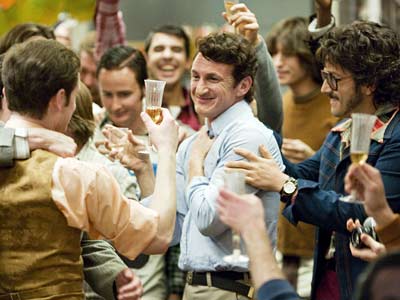
The following appeared in the December issue of ICON and is reprinted with permission (thanks, Trina).
Can someone tell me why Sean Penn is getting Oscar talk? Frank Langella and Mickey Rourke should be pissed right now.
To my knowledge, the release of Gus Van Sant's Milk brings us the first gay historical epic. For those who have forgotten, Harvey Milk (1930-78) was the first openly gay man to hold a major political office in America.
The movie's release also shows that, more and more, gays are finding their way into the mainstream. So much so that a gay icon now gets an idealistic retrospective with an all-star cast. It's better than the alternatives: hot-button flicks like Philadelphia or stereotype-based comedies like In & Out and The Birdcage.
The movie's release also shows that, more and more, gays are finding their way into the mainstream. So much so that a gay icon now gets an idealistic retrospective with an all-star cast. It's better than the alternatives: hot-button flicks like Philadelphia or stereotype-based comedies like In & Out and The Birdcage.
Despite Milk's significance, there's really no need to fork over $10 to see Sean Penn striving hard for another Academy Award, or to watch the movie try on storylines the way a love-crazy high school senior tries on prom dresses. The movie should be used as a springboard to learn more about Milk, and luckily there are two great resources--Randy Shilts' book, The Mayor of Castro Street, and Rob Epstein's documentary, The Times of Harvey Milk. Milk may be seen by more people, but it doesn't have half the impact of those earlier works.
In the newest effort, Milk (Penn), 40 years old and desperate for a change, moves from New York to San Francisco with boyfriend Scott Smith (James Franco). Milk opens a camera store, but his reputation as an activist thrives more than his business. Soon, Castro Camera becomes a meeting place for politically-minded homosexuals looking for acceptance, with Milk leading the cause against the likes of Anita Bryant and unforgiving city policemen.
He campaigns tirelessly throughout the 1970s before being elected to the San Francisco Board of Supervisors in 1977. His rise comes at a cost. First, Scott, tired of Milk's desire to help everyone, leaves. Milk's next boyfriend, the needy Jack Lira (Diego Luna), doesn't go so quietly. On the professional front, Milk soon draws the ire of colleague Dan White (Josh Brolin).
Milk's accomplishments during his brief time as an elected official were staggering. He spearheaded the passing of a San Francisco ordinance that prevented citizens from being fired due to sexual orientation. He also rallied support against the passing of California's Proposition 6, which would have allowed schoolteachers to be fired for being gay.
Certainly, it's a memorable, important life, only Van Sant and writer Dustin Lance Black refuse to narrow their focus on Milk's life as a politician. We get a glossy overview that plays like a high-budget adaptation of an eighth grader's book report. Milk's relationship with White had life-altering consequences, but White's crumbling rapport (along with his crumbling sanity) is handled almost as an afterthought. We're introduced to Harvey's squadron of aides and volunteers, but their stories get lost in the race to chronicle every detail.
Milk's relationships with Scott and Jack bog down the film's political momentum, coming across as redundant attempts to humanize the man. After all, wasn't Milk's work based on establishing human rights? It's not like he was soullessly lobbying for sales tax reform or streets free of potholes. If Van Sant and Black had focused on one aspect of Milk's political career--the passionate fight against Proposition 6, his corrosive relationship with homophobe White and its tragic aftermath--the movie would have been a throbbing testament to civil rights. Instead, the movie goes big and broad, simultaneously caricaturing and minimizing Milk's political zeal.
Penn's performance doesn't shake the feeling that Milk is more about size and flash than substance. Penn used to vanish into a role. He became a jazz guitarist or a California pothead or a sleazy 1970s lawyer. In recent years, Penn has concentrated on delivering performances that have the subtlety of a shotgun blast. Consequently, you can't watch Milk without Penn's effort coming across as a threat: "You want me to play gay? By God, you'll get a ton of gay, pal."
Someone has to tell Penn that it's OK to underplay, so audiences know that he's playing a character and not further establishing a brand. But those are the consequences of the big, sweeping historical epic. You get big performances, big storylines; everything gets super-sized. In the case of Milk, bigger definitely isn't better.

No comments:
Post a Comment